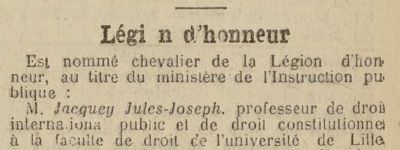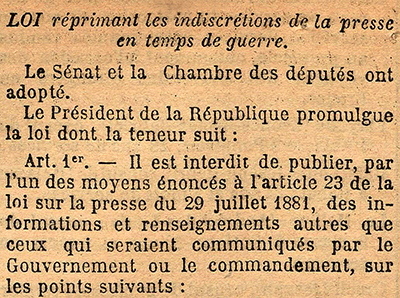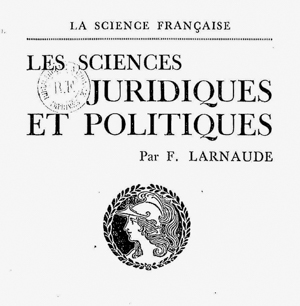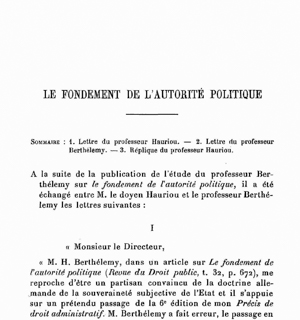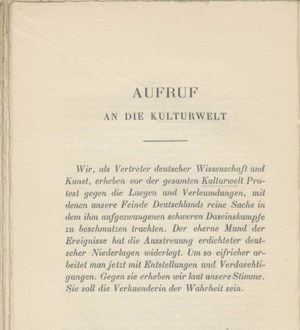Jules Jacquey’s career was coming to an end when the war broke out, a career that had taken place exclusively in Lille since he was appointed there in 1885, the year following his success at the aggregation. This anchoring was quite rare for a native of another region, in this case Haute-Saône. No doubt we must see the effect of his marriage, celebrated in Bergues in 1885, as the bride came from a family rooted in Flanders. At the end of the summer of 1914, frightened by the rumors of barbarism peddled by the refugees from Belgium, the jurists – magistrates, lawyers and professors -, took, in large numbers, the path of exodus. In October, only four of the sixteen law school professors remained or returned to Lille :pour lire la suite…
Category: The jurists’ war
The reflections of a Bordeaux law professor on freedom of opinion : Duguit and press censorship during the 1914-1918 war
Propaganda occupied a prominent place in the history of the Great War, because of its total and spectacular character. Even today, few textbooks address the years 1914-1918 without mentioning the word “brainwashing”, describing the unanimous and ubiquitous media tone at the beginning of the conflict, exacerbating heroism and national assets while demonizing – even ridiculing – the German enemy. The main challenge was then to convince citizens of the correctness and the merits of the war. Censorship, a negative and complementary aspect of propaganda, was an equally total institution. Total, because the control it exercised extended to all political actors (members of the government, political parties), to all written production (press and publishing) as well as live performances (theater, songs). If the First World War contributed topour lire la suite…
Legal propaganda in the Great War : the example of Ferdinand Larnaude’s Sciences juridiques et politiques [Legal and Political Sciences] (1915)
In 1915, the World’s Fair left the Old Continent for the United States ; this was not a first, since Philadelphia, Chicago and St. Louis had already hosted this event before. Recovering from the terrible earthquake of 1906, the city of San Francisco was this time chosen to receive the exhibitors of the twenty-four participating countries ; between March and December 1915, it would welcome about nineteen million visitors. The event, as always, revolved around a major theme. For this iteration, it was the Panama Canal, completed and inaugurated a year earlier, that was in the spotlight : the exhibition was renamed “Panama- Pacific” for the occasion. Indeed, this canal, whose titanic work began in 1882, allowed an unprecedented expansion of maritime trade and contributed to the strongpour lire la suite…
The uses of war in public law controversy
The doctrinal positions of lawyers were directly impacted by the conflict. A double re-reading of legal thought was carried out : because of the war, by the rediscovery and the highlighting of the radical opposition of the French and German doctrine of law and the state, but also in relation to the war, according to an enterprise of labeling and denial of certain theoretical commitments that could be demonized from their supposed kinship with the doctrine on the other side of the Rhine. In this case, the divisions were reinterpreted using the passions and affects generated by the conflict. If, under the first aspect, the legal doctrine was therefore clearly instrumentalized in the service of the victory of the nation, under the second, it was onpour lire la suite…
The Paris Faculty of Law denounces the violation of the law of nations by Germany
From the beginning of the Great War, the professors of the Paris Faculty of Law denounced the “violation de tous les principes [violation of all the principles]” of the law of nations by the Germans, in particular the attack on the neutrality of Belgium which was guaranteed by treaties to which Prussia had subscribed. Didn’t Chancellor Bethmann-Hollweg, “descendant d’un des professeurs de droit les plus connus de l’Allemagne [descendant of one of Germany’s best-known law professors]” (Moritz Bethmann-Hollweg, one of Savigny’s students) say that “les traités ne sont que des chiffons de papier [treaties are nothing but scraps of paper]” ? This “parole impie [unholy word]” was recalled by Dean Larnaude in his speech to his colleagues on 7 November 1914 on the eve of thepour lire la suite…
The jurists’ war
15 June 20239 November 2023 Des facultés sur le front du droitThe jurists’ war The Paris Faculty of Law denounces the violation of the law of nations by Germany From the beginning of the Great War, the professors of the Paris Faculty of Law denounced the “violation de tous les principes [violation of all the principles]” of the law of nations by the Germans, in particular the attack on the neutrality of Belgium which was guaranteed by treaties to which Prussia had subscribed. Didn’t Chancellor Bethmann-Hollweg, “descendant d’un des professeurs de droit les plus connus de l’Allemagne [descendant of one of Germany’s best-known law professors]” (Moritz Bethmann-Hollweg, one of Savigny’s students) say that “les traités ne sont que des chiffons de papier [treaties are nothingpour lire la suite…

